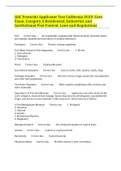QAC Pesticide Applicator Test California 2023: Core Exam, Category A Residential, Industrial, and Institutional Pest Control, Laws and Regulations
Pest Correct Ans - An undesirable organism that injures humans, desirable plants and animals, manufactured products, or natural substances
Pathogens Correct Ans - Disease causing organisms
Four Main Groups of Pest Organisms Correct Ans - 1. Weeds
2. Invertebrates
3. Pathogens
4. Vertebrates
Weed Correct Ans - Undesirable plant
Invertebrate Examples Correct Ans - Insects, mites, ticks, spiders, snails, slugs
Pathogen Examples Correct Ans - Bacteria, viruses, fungi, nematodes, mycoplasmas,
and other microorganisms
Vertebrate Examples Correct Ans - Birds, reptiles, amphibians, fish, rodents, and other mammals
Importance of Pest Identification Correct Ans - Applicators can learn about its life cycle, behavior, characteristic damage, factors that favor its development, susceptible life stages, and known control methods. Could cause pest control success or failure.
6 Pest Management Methods Correct Ans - 1. Biological
2. Chemical
3. Cultural
4. Genetic
5. Mechanical/Physical
6. Regulatory
Biological Control Correct Ans - Use of natural enemies to control pests.
Avicide Correct Ans - Control or repel pest birds
Bactericide Correct Ans - Control bacteria
Chemosterilants Correct Ans - Sterilize insects or pest vertebrates Defoliants Correct Ans - Causes leaves to drop from plants
Desiccants Correct Ans - Promote drying or loss of moisture from plant tissues and insects
Disinfectants Correct Ans - Control microorganisms
Fungicide Correct Ans - Control fungi
Growth Regulators Correct Ans - Alter growth or development of plant or animal
Herbicide Correct Ans - Control weeds
Insecticide Correct Ans - Control insects and related arthropods
Miticide Correct Ans - (Acaricide) Control mites
Molluscicides Correct Ans - Control snails and slugs
Nematicides Correct Ans - Control nematodes
Ovicides Correct Ans - Destroy eggs
Pheromone Correct Ans - Attract insects
Piscicides Correct Ans - Control pest fish
Predacides Correct Ans - Control predatory vertebrates
Repellants Correct Ans - Repel insects, mites, ticks, pest vertebrates, invertebrates, birds, and mammals
Rodenticides Correct Ans - Controls rodents
Selective Pesticide Correct Ans - Toxic to some pests, but have little or no effect on others
Systemic Pesticide Correct Ans - Absorbed and translocated within a plant or animal
Contact Pesticide Correct Ans - Must directly touch the pest or a site the pest frequents
Persistence Correct Ans - How long a pesticide remains actives to control pest Residual Pesticides Correct Ans - Control pests long term (ie weeks, months, or years)
Cultural Control Correct Ans - Practices that reduce pest establishment, reproduction, dispersal, and survival
Examples of Cultural Controls Correct Ans - Mowing, irrigation, aeration, fertilization, crop selection, etc.
Genetic Control Correct Ans - Selected or bred to resists specific pests
Mechanical Control Correct Ans - Kill a pest directly or make its environmental unsuitable
Examples of Mechanical Control Correct Ans - Traps, mulches, fences, cloth mesh, etc.
Quarantine Correct Ans - Pest control process designed to prevent entry of certain pests into pest-free areas
Eradication Correct Ans - Elimination of a pest from a designated area
Integrated Pest Management Correct Ans - Strategy that utilizes a wide range of pest control tactics to prevent pests from reaching economically or aesthetically damaging levels with the least risk to the environment
Why Practice IPM (5) Correct Ans - 1. Balanced ecosystem.
2. Pesticides can be ineffective.
3. Can save money.
4. Promotes healthy environment.
5. Maintains good public image.
5 Components of IPM Correct Ans - 1. Identify the pest and understand its biology
2. Monitor the pest to be managed
3. Develop pest management goal
4. Implement program
5. Record and evaluate results
Key Pests Correct Ans - May cause major damage on regular basis unless they are controlled
Secondary Pest Correct Ans - Become pests when key pests are controlled or absent
Occasional Pest Correct Ans - Sporadically become problematic due to life cycles, environmental influences, or as a result of human activities




